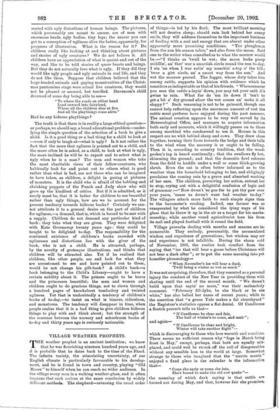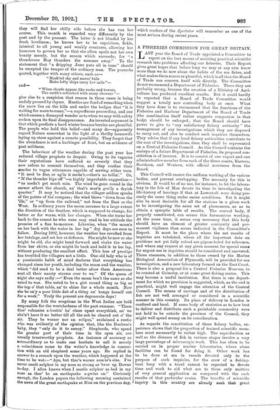VILLAGE WEATHER PROPHETS. T HE weather prophet is an ancient institution;
we know that he was flourishing nineteen hundred years ago, and it is probable that he dates back to the time of the Flood. The infinite variety, the stimulating uncertainty, of our English climate is particularly favourable to his develop- ment, and he is found in town and country, playing " Old Moore" to himself when he can reach no wider audience. In the village every man is a walking weather-glass, and it often happens that each arrives at the same conclusion by widely different methods. The shepherd—reversing the usual order
of things—is led by his flock. The most brilliant morning will not deceive sheep; should rain lurk behind her sunny smile, they will address themselves to the important business of feeding with a zeal and energy that are absent under other apparently more promising conditions. "The ploughman from the sun his season takes," and also from the moon. Said one to the writer when consulted as to what the morrow would be :—"I thinks as 'twull be wet; the moon looks party middlin', an' thee war a smartish circle round the sun to-day. I sin 'un when I war satin' my nunchin' a-top o' the hill; 'twur a girt circle, an' a smart way from the sun." And wet the morrow proved. The fogger, whose duty takes him among cattle, supports his opinion with evidence which he considers as indisputable as that of his friends. " Whensumever you sees the cattle a-layin' down, you may tek your oath it's gwine to rain. What fur do 'um lie down if 'ten't to get a bit o' dry ground afoor the wet comes an' meks it all sloppy P " Such reasoning is not to be gainsaid, though one cannot help reflecting upon the enormous amount of rest the cattle must perforce have enjoyed during the past summer. The animal creation appears to be very well served by its Meteorological Office, and manages to acquire information both early and accurate, which it willingly passes on to those among mankind who condescend to use it. Horses in this respect are no whit behind sheep and cows. They draw close together, turning their faces towards the hedge and their tails to the wind when the mercury is or ought to be falling. Then it is, according to country tradition, that the wood. pecker's tap is heard continually ; that the swallows fly low, skimming the ground; and that the domestic fowl retreats from the field to huddle under a wall or some thick-growing shrub. Even the cat is often better informed as to the weather than the household belonging to her, and obligingly proclaims the coming rain by a grave and absorbed washing of her ears. The children, perceiving her action, entreat her to stop, crying out with a delightful confusion of logic and of grammar :—" Now dwun't 'ee goo fur to put thy paw over your years, 'cause us dwun't want bad weather to-day." The villagers attach more faith to such simple signs than to the barometer's reading. Indeed, one farmer was so exasperated by what he considered the lying ways of his glass that he threw it up in the air as a target for his marks- manship ; while another vexed agriculturist tore his from its nail and played football with it round the field.
Village proverbs dealing with months and seasons are in- numerable. They embody, presumably, the accumulated wisdom and experience of generations; but wisdom may err and experience is not infallible. During the sharp cold of November, 1901, the rustics took comfort from the saying that " ice that will bear a goose before Christmas will not bear a duck after "; or to put the same meaning into yet homelier phraseology- " When November's ice will bear a duck, 'Twill bring a winter as wet as muck."
It was not surprising, therefore, that they resented as a personal injury the conduct of the New Year in providing them with skating until the end of the second month. " We dursn't build upon that sayin' no more," was their melancholy comment. "February fill-dyke, be she black or be she white," has also belied her name of recent years ; while to the assertion that "a green Yule makes a fat churchyard" the Registrar's statistics oppose a flat denial. Of Candlemas a Scotch proverb tells us that-
" If Candlemas be clear and fair, The half of winter's to come, and main"; and again- " If Candlemas be clear and bright,
Winter will take another flight"— which is discouraging to those who love warmth and sunshine. There seems no sufficient reason why "fogs in March bring frost in May," except, perhaps, that both are equally mis- placed, and could well be struck off the roll of disagreeables without any sensible loss to the world at large. Somewhat strange to those who imagined that the " merrie month" enjoyed a fixed place in the calendar is the information that—
"Come she early or come she late, She's bound to make the old cow quake "- the meaning of which dark saying is that cattle are turned out during May, and that, however fair she promises, they will find her chilly side before she has run her course. This month is regarded very differently by the poet and by the peasant. The latter is not blinded by her fresh loveliness ; he knows her to be capricious, fickle, inimical to all young and weakly creatures, allowing her humours to govern her so that she often spoils not her own beauty merely, but the season which succeeds ; for " a thunderous May thunders the summer away." To the statement that "a dripping June puts all in tune" should be excepted the temper of the ordinary man. The proverbs quoted, together with many others, such as-
"Mack'rel sky and mares' tails Make lofty ships carry low sails"— "When clouds appear like rocks and towers, The earth's refreshed with many showers "- give rise to a suspicion that reason in these cases is being unduly pressed by rhyme. Rustics are fond of remarking when the snow lies on the hills and under the hedges that " it is waiting for more to come,"—a superfluous proceeding, and one which causes a dismayed wonder as to when we may with safety reckon upon its final disappearance. An inverted argument is that which predicts a bard winter because berries are plentiful. The people who hold this belief—and many do—apparently regard Nature somewhat in the light of a thrifty housewife laying up store against a remote possibility. They forget that the abundance is not a harbinger of frost, but an evidence of past mildness.
The behaviour of the weather during the past year has reduced village prophets to despair. Owing to its vagaries their reputations have suffered so severely that they now refuse to commit themselves, and they confine their oracles to vague utterances capable of serving either turn. "It med be fine, or ag'in it medn't,—ther's no tellin'." Or, " If the thunder kips off "—a highly improbable suggestion— "us medn't get much rain. The wind be gone round in the earner athert the church, an' that's mos'n gen'ly a dryish quarter." It may be noticed that the villager seldom speaks of the points of the compass ; the wind blows " down from the 'ills," or "up from the railroad," not from the East or the West. In ordinary years the moon assumes to a large extent the direction of the weather, which is supposed to change, for better or for worse, with her changes. When she turns her back to the sunset he who runs may read in her attitude the promise of a fine to-morrow. Likewise, when "the moon's on her back with the water in her lap" dry days are sure to follow. During 1902, however, the weather has revolted from her tutelage, and set her at defiance. She might be new or she might be old, she might bend forward and shake the water from her skirts, or she might lie back and hold it in her lap, without producing the smallest effect. This loss of prestige has troubled the villagers not a little. One old lady who is of a pessimistic habit of mind declares that everything has changed since her youth, including the moon and the weather, which "did used to be a deal better afoor them Americans sent all their naesty starms over to we." Of the queen of night she says sadly :—" Even the moon ben't the same as she noted to was. She listed to be a girt round thing as big as the top o' that table, an' to shine fur a whole month. Now she be on'y a poor little dab of a thing an' hangs herself out fur a week." Truly the present are degenerate days !
By many folk the eruptions in the West Indies are held responsible for the wretchedness of the past summer. "Them thee volcanies a-buitin' ha' clan upset everythink, an' we sha'n't have it no better till all the ash be cleared out o' the air. They be worser nor an eclipse," exclaimed a rustic who was evidently of the opinion that, like the Duchess's baby, they " only do it to annoy." Shepherds, who spend the greater part of their time in the open air, are usually trustworthy prophets. An instance of accuracy so extraordinary as to make one hesitate to call it merely a coincidence came to the writer's knowledge in connec- tion with an old shepherd some years ago. He replied in answer to a remark upon the weather, which happened at the time to be wet:—" Aye, but ther's worser som'er's else. I've never smelt sulphur in my nose sa strong as 'twur up Downs to-day. I allus knows when I smells sulphur sa bad in my nose as ther' be an earthquake a-gwine on." Curiously enough, the London papers the following morning contained the news of the great earthquake at Nice on the previous day, and— which readers of the Spectator will remember as oue of the most serious during recent years.











































 Previous page
Previous page